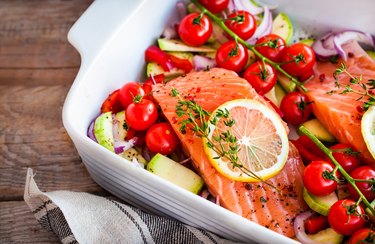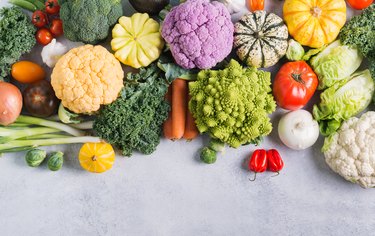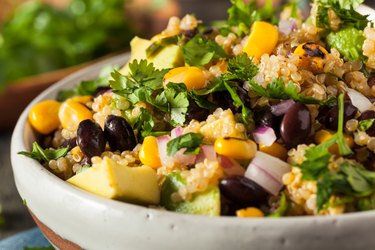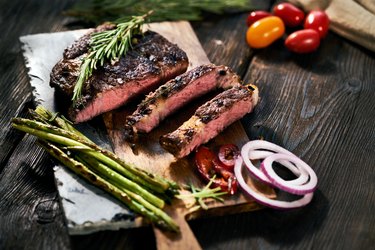
After you've been diagnosed with breast cancer, it's important to understand how to best fuel your body. A healthy diet is just one of many lifestyle factors to consider following your diagnosis — others include physical activity, stress management and sleep.
During treatment, eating foods that meet your nutritional needs may help you handle treatment side effects, boost your energy levels and lower your risk of infection, per the American Cancer Society (ACS). More research is needed to determine what specific diet — if any — can lower the risk of breast cancer reoccurrence after treatment, per the ACS.
But what's not up for debate is the benefit of eating a nutritious, healthy diet. For one, breast cancer statistics show doing so will help you maintain your weight. For cancer survivors, having overweight or obesity increases the likelihood of a reoccurrence, per the National Comprehensive Cancer Network (NCCN). Plus, after treatment, healthy food choices can help you regain strength and feel better, notes the ACS.
The following are foods to incorporate into your diet to support overall health and wellness, as well as some that are best avoided.
4 Healthy Foods to Add to Your Diet
1. Fruits and Vegetables

"Fruits and vegetables have antioxidant phytochemicals that have anti-cancer properties," says Christy Alexon, PhD, RD, associate professor at Arizona State University. Phytochemicals are naturally occurring compounds found in plants — such as fruits, vegetables and grains — that may have health benefits, per the National Cancer Institute (NCI).
Eat a variety of brightly colored fruits and veggies daily, Alexon says. Aim for at least 5 servings of fruits and vegetables per day, prioritizing cruciferous vegetables like broccoli, cauliflower, kale and Brussels sprouts, which are especially high in those phytochemicals, per Johns Hopkins Medicine.
Related Reading
2. Lean and Plant-Based Proteins
Lean sources of animal protein — such as poultry and fish — are important for a healthy diet following a breast cancer diagnosis. "Lean protein and protein from fish naturally high in omega-3 fatty acids (like salmon) are important to help maintain muscle mass, support healing of tissues and manage inflammation," Alexon says.
Aim to have 46 grams of protein a day, per the 2015-2020 Dietary Guidelines for Americans.
Don't hesitate to include soybeans — or soy products, such as tofu, edamame and soy sauce — in your diet as well. There is no increased risk to breast cancer survivors who consume soy, per the American Institute for Cancer Research (AICR).
"Contrary to popular belief, soy is safe to eat and many studies show an intake of soy may reduce cancer risk and reoccurrence," says Nicole Giller, a registered dietitian specializing in oncology.
Other beans and legumes are also excellent sources of plant-based protein, not to mention plenty of fiber (more on that below).
Tip
Protein and other nutrition needs may change during breast cancer treatment, so consult with your doctor or a registered dietitian for specific recommendations.
3. Whole Grains

These complex carbohydrates are rich in phytochemicals and fiber.
Eating fiber-rich foods has been linked to lower odds of developing breast cancer, per a July 2020 meta-analysis in Cancer. And, an increased fiber intake may be responsible for reductions in circulating estrogen in breast cancer patients, which may help prevent cancer reoccurrence, according to a June 2016 analysis in Current Breast Cancer Reports.
Aim for 25 to 30 grams of fiber per day, according to Johns Hopkins Medicine. If you're currently eating far less than the daily recommendation, it's important to increase your fiber intake slowly over a week or two. This will minimize any gastrointestinal effects of increased fiber, like gas and bloating.
Recommended Whole Grains
- Amaranth
- Barley
- Whole wheat
- Brown rice
- Oats
- Quinoa
- Popcorn
4. Healthy Fats
Some fats — like saturated fats — are best avoided. Aim instead to add monounsaturated and polyunsaturated fats to your diet, according to Memorial Sloan Kettering Cancer Center (MSKCC). These are found in plant foods and seafood, per MSKCC.
In particular, you'll want to up your intake of foods with omega-3 fats, which are found in fatty fish, such as salmon and sardines. Aim to eat these types of fish twice a week, or more, recommends NCCN. Having omega-3 fats may "inhibit the growth of breast tumors," per Johns Hopkins Medicine.
Recommended Fat Sources
- Fish and other seafood, particularly salmon, sardines and anchovies
- Nuts such as walnuts and almonds
- Canola oil
- Olive oil
- Avocado
- Flaxseed
3 Foods to Avoid After a Breast Cancer Diagnosis
1. Saturated Fats

There isn't decisive research that identifies a high-fat diet as particularly problematic for breast cancer survivors. Studies have "offered mixed results," BreastCancer.org notes, pointing in particular to two large, influential studies on diet and outcomes for people with breast cancer.
The first is the Women's Healthy Eating and Living study (WHEL), which found that a low-fat diet did not change survival or reoccurrence rates for people diagnosed with breast cancer, per the July 2007 results published in JAMA.
However, analyzing the data from the Women's Health Initiative Dietary Modification clinical trial — which included more than 48,000 post-menopausal women who were randomly assigned to stick with their usual eating habits or follow a low-fat diet — revealed that eating a low-fat diet after a breast cancer diagnosis was associated with a higher survival rate, per September 2017 Journal of Clinical Oncology findings.
Today, experts recommend limiting your intake of saturated fats; after treatment, these fats should make up less than 10 percent of your daily calories, per BreastCancer.org. Saturated fats are found in red meat and high-fat dairy products (think: cream, butter and full-fat cheese); consuming less of these foods is good for your heart health and also helps you maintain a healthy weight, per the U.S. National Library of Medicine.
Trans fats are also off-limits, per MSKCC.
Limit These Fats
- Red meat (beef, pork)
- Full-fat dairy, including milk, cheese and ice cream
- Coconut oil and coconut milk
- Any foods containing trans fats, such as some coffee creamers, deep-fried foods or some margarines
2. Alcohol
While the 2015-2020 Dietary Guidelines for Americans suggest that women should consume no more than one drink per day, it might be best to avoid alcohol all together. If you've been diagnosed with breast cancer — or have an increased breast cancer risk — limit yourself to less than one drink a day, per the Mayo Clinic.
Alcohol has the potential to increase levels of estrogen and other hormones associated with hormone receptor-positive breast cancer, according to Breastcancer.org. Compared to women who don't drink at all, women who have three alcoholic drinks per week have a 15 percent higher risk of breast cancer, per Breastcancer.org. The link between alcohol and breast cancer reoccurrence is currently unclear and warrants additional research.
3. Processed Foods
Processed foods tend to be higher in sodium, saturated fats, trans fats, refined grains and added sugar than homemade items that are not meant to stand the test of time on a grocery store shelf. While there is nothing inherently bad about processed foods, they don't contribute much in the way of phytochemicals, antioxidants or other health-supporting compounds.
And, by limiting these foods, you'll have more room in your diet for fresh fruit and vegetables, whole grains, lean proteins and healthy fats, the healthiest foods to eat when diagnosed and progressing through treatment, Giller says.
Is this an emergency? If you are experiencing serious medical symptoms, please see the National Library of Medicine’s list of signs you need emergency medical attention or call 911.